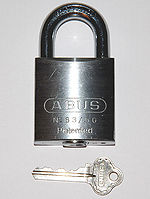ABUS 83: Difference between revisions
(→ABUS 83: Added model listing, information from ABUS literature. Some details are currently missing.) |
m (→Model listing: corrected minor typo) |
||
| Line 53: | Line 53: | ||
|83CS/50 | |83CS/50 | ||
|Brass | |Brass | ||
| | | | ||
|9.5 | |9.5 | ||
|412 | |412 | ||
| Line 103: | Line 103: | ||
|Steel | |Steel | ||
| - | | - | ||
| | |14 | ||
|1287 | |1287 | ||
|10 | |10 | ||
|} | |} | ||
== Vulnerabilities == | == Vulnerabilities == | ||
Revision as of 06:06, 6 February 2013
ABUS 83
| ABUS 83/50 | |
 | |
| Name | ABUS 83/50 |
|---|---|
| Manufacturer | ABUS |
| Lock Type | Padlock |
| Lock Design | Pin-tumbler |
The 83 series is a versatile assortment of pin-tumbler padlocks made by ABUS. They are designed for medium to high security applications and are not only keyway-compatible with most major manufacturers, but also accept cylinders from Schlage, Sargent, Lori, Medeco and others (for example, Abloy and Bilock). IC versions of the 83-series locks are also available, accepting SFIC and LFIC Schlage interchangable cores. The 83 series is also somewhat famous for including one of the largest commercially produced padlocks, "The Rock" 83/80 which is 3 1/4 in (82.5mm) wide and features a 9/16 (14mm) shackle.
ABUS recently released the S2 (series 2) version of these padlocks, which can be identified by the updated logo on the lock body. Series 2 versions feature updated components; one of the most notable changes is the new "3 in 1" bolt driver which eliminates the need to manually rewind the spring on the bolt driver if it is removed from the body.
Features
These locks feature a component called the Z-bar that allows the lock to be quickly converted between key-retaining and non key-retaining by the user. With the release of the series 2 locks, the shape of this component has changed and they are not compatible. The two versions can be identified by their different shapes and the colour of the dot (series 1 is red, series 2 is black).
Model listing
| Model | Body
Material |
Dimensions (mm) | Shackle
diameter (mm) |
Weight (g) | ABUS security
classification |
|---|---|---|---|---|---|
| 83/45 | Brass | 46.5/85/20.5 | 8 | 361 | 8 |
| 83/50 | Brass | 48/87.5/20.5 | 9.5 | 380 | 8 |
| 83CS/50 | Brass | 9.5 | 412 | - | |
| 83/55 | Steel | 55/103.5/25 | 11 | 620 | 9 |
| 83CS/55 | Steel | 55/91.5/25 | 11 | 620 | 9 |
| 83WPIB/53 | Brass | - | - | - | - |
| 83WP/53 | Steel | - | - | - | - |
| 83WPCS/53 | Steel | - | - | - | - |
| 83WP/63 | Steel | - | - | - | - |
| 83/80 | Steel | - | 14 | 1287 | 10 |
Vulnerabilities
Depending on the cylinder used, the 83 series locks may be vulnerable to the following attacks:
Disassembly
- Unlock the padlock.
- Remove the retaining screw that was concealed by the shackle to free the cylinder.
- Close the shackle and gently tap the body on a hard surface to release the bolt driver, spring and ball bearings.
- Remove the shackle which will expose the shackle spring.
Replacing the shackle
- Method 1
Unlock the padlock and remove the cylinder. With a broad flat-headed screwdriver, rotate the bolt driver 45 degrees clockwise while gently pulling on the old shackle to release it. Press new shackle into position and release bolt driver.
- Method 2
With the shackle in the closed position, lightly tap the padlock on a hard surface to extract the bolt driver and locking balls from the lock body. The shackle can be removed and replaced. Re-insert the locking balls with a little bit of grease, followed by the bolt driver - be sure the pigtail on the driver aligns with the correct groove. If this is done on series 1 locks, you will also need to rewind the spring which is difficult without the correct tool supplied by Abus.
Gallery
External links




